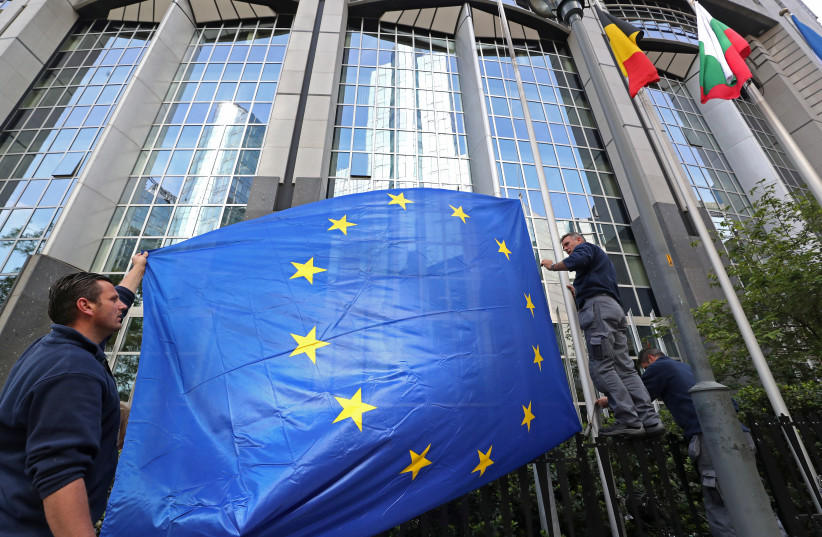The European Union will add 37 individual entries to its sanctions against Iran on Monday, two sources told Reuters, as the European Parliament called on it to designate the Islamic Revolutionary Guard Corps as a terror organization.
"We will adopt the fourth package of sanctions against Iran on Monday and we believe we should already start working on the fifth one to list IRGC as a terrorist organization," said one of the sources, an EU diplomat.
Both sources said 37 new names would be blacklisted for human rights violations when the bloc's foreign ministers meet on Monday. The sanctions would mean the IRGC members would not be allowed to travel to the EU and any assets they hold in Europe would be frozen.
The EU diplomat added, however, that the IRGC would not be sanctioned as an organization - yet.
"If you do this, it has to be legally sound and that is being discussed right now. But it won't be ready for Monday."

The EU's chief executive, European Commission President Ursula von der Leyen, backed listing the IRGC as a terror organization in response to what she said was the trampling of fundamental human rights in the Islamic republic.
Netanyahu's pressure on Iran
Prime Minister Benjamin Netanyahu has put increasing sanctions on Iran and halting its nuclear program at the top of his foreign policy agenda, specifically lobbying for the EU and individual countries to place the IRGC on their terror lists. To date only the United States, Bahrain and Saudi Arabia have done so.
Netanyahu discussed Iran and IRGC with British Prime Minister Rishi Sunak, who said he intends to visit Israel this year, which marks the 75th anniversary of ties between the two countries.
According to the Prime Minister's Office, "Netanyahu expressed his satisfaction over Britain's intention to declare the Revolutionary Guards a terrorist organization and stressed the importance that Israel ascribes to advancing the issue."
European lawmakers adopted a resolution on Thursday calling for more sanctions against all Iranian individuals and entities responsible for human rights violations and also voted for the Revolutionary Guard Corps to be designated as a terrorist entity. A similar vote was taken on Wednesday as well.
"Iranian authorities must end crackdown on their own citizens (...) Supreme Leader Ali Khamenei and President Ebrahim Raisi should be added to the sanctions list," the European Parliament said in a statement.
Demonstrations in Iran
Anti-government demonstrations erupted in Iran in September after the death in custody of Kurdish Iranian woman Mahsa Amini, who had been detained by morality police enforcing the Islamic Republic's mandatory dress code for women.
"The Iranian regime's blatant disregard for human dignity and the democratic aspirations of its own citizens as well as its support to Russia "necessitate further adjustments in the EU's position towards Iran," the adopted resolution said.
Iran warned earlier that the European Union would "shoot itself in the foot" if it designated the Revolutionary Guard Corps as a terrorist entity.
On Wednesday, the European Parliament called for the EU to list the Revolutionary Guard as a terrorist organization, blaming it for the repression of domestic protesters and the supply of drones to Russia's military for use in Ukraine.
The European Union has acted as a broker for talks to revive the 2015 Iran nuclear deal, known as the Joint Comprehensive Plan of Action. Talks have faltered, but EU foreign policy chief Josep Borrell has looked to the matter forward. The European parliament resolutions did not call for the EU to halt its efforts to advance the JCPOA.
Iran and world powers, including EU members France and Germany, have engaged in negotiations since 2021 to revive a 2015 nuclear deal, with discussions in a stalemate since September
